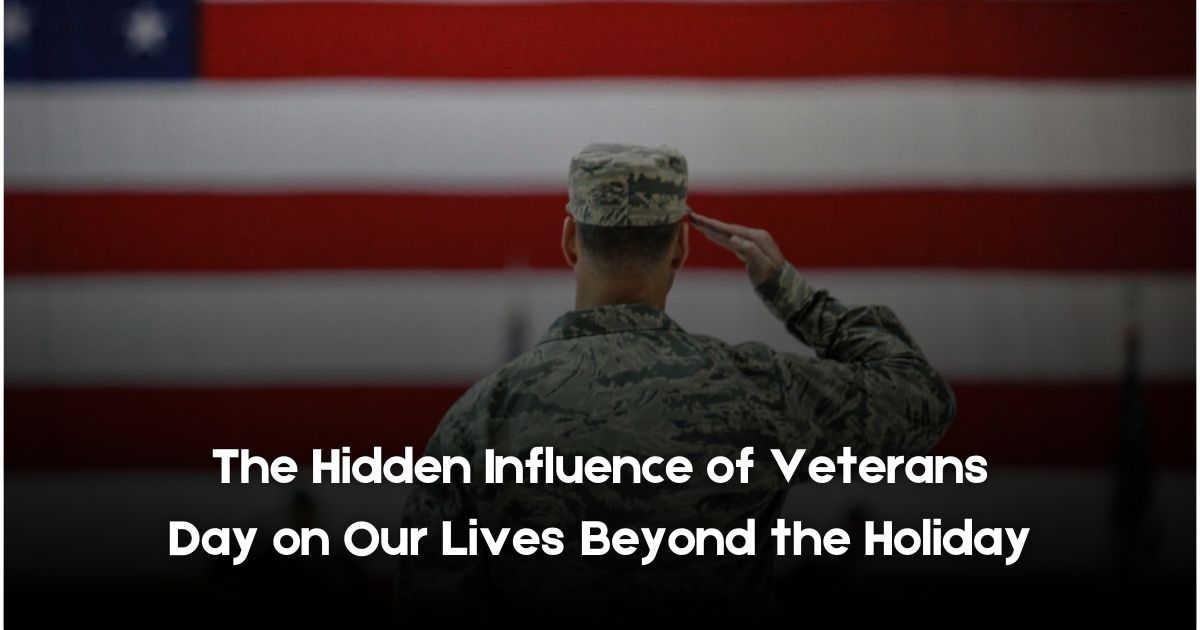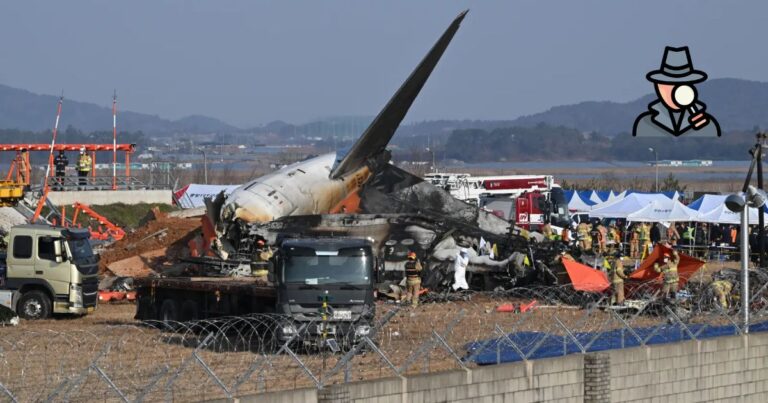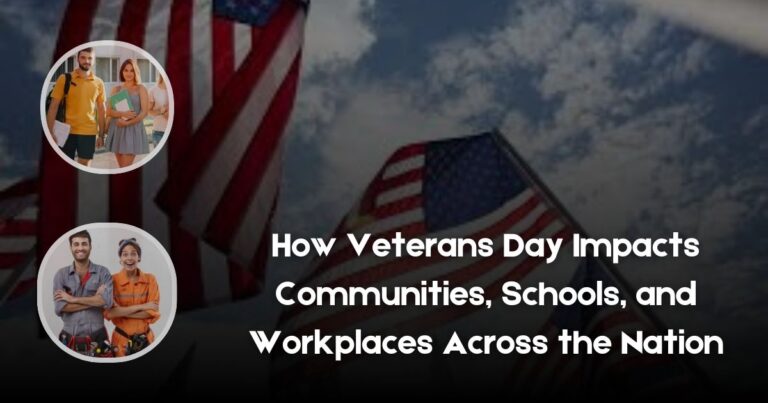
Veterans Day, celebrated every year on November 11, is a time to honor and recognize the brave men and women who have served in the military. While it’s known as a day of gratitude, remembrance, and patriotic celebrations, the influence of Veterans Day extends beyond just one day. The values, stories, and lessons associated with this holiday quietly impact our lives, communities, and everyday routines in ways that may not always be visible. This article explores how Veterans Day influences life beyond the holiday itself.
1. Inspiring a Culture of Gratitude
On Veterans Day, people across the country take a moment to thank veterans for their service. Whether through community events, parades, or private moments of reflection, gratitude becomes the focus. But this spirit of gratitude often doesn’t end on November 11. Many people carry this mindset forward, bringing a sense of appreciation for service and sacrifice into their daily lives.
In schools, workplaces, and communities, this gratitude shows up in small acts of kindness, appreciation for public service, and respect for others. By regularly acknowledging those who have served, we create a culture that values and respects the sacrifices of others. This ongoing gratitude can help us appreciate more than just veterans—teachers, nurses, firefighters, and others who serve their communities often feel the ripple effects of this gratitude, making our communities more connected and compassionate.
2. Supporting Veterans Year-Round
Veterans Day also brings attention to the needs of veterans, highlighting issues such as mental health, employment, and housing. While the holiday brings a surge in support for veterans, these challenges require ongoing attention and solutions. Many organizations, nonprofits, and government programs extend their outreach throughout the year, ensuring veterans have the support they need long after the holiday has passed.
For example, local charities and national organizations often work year-round to provide housing assistance, job training, and health resources for veterans. The awareness that Veterans Day brings often translates into continuous donations, volunteerism, and advocacy from the public. When people understand the struggles veterans may face, they’re more likely to contribute to support efforts, making a real difference beyond a single day.
3. Educational Influence in Schools
Veterans Day provides a unique educational opportunity for students. Many schools organize events or activities to teach young people about the importance of military service, the history of Veterans Day, and the significance of patriotism. This learning extends beyond just one day, as these lessons often become part of a broader understanding of history, citizenship, and empathy for others.
Through Veterans Day assemblies, classroom discussions, and visits from veterans, students gain a deeper awareness of the sacrifices made by those who serve. These lessons teach respect, resilience, and an understanding of American history, fostering a sense of civic responsibility that students can carry with them throughout their lives. As a result, the holiday becomes more than just a day off school; it becomes a chance to shape future generations with values of respect, gratitude, and responsibility.
4. Strengthening Community Connections
Veterans Day events are often organized by local communities, bringing together neighbors, families, and community leaders. Whether it’s a local parade, a breakfast gathering, or a flag ceremony, these events give people a chance to connect with others and foster a shared sense of pride. The connections made on Veterans Day can extend into everyday life, strengthening relationships within neighborhoods and cities.
When communities come together to honor veterans, they often form stronger bonds. This sense of unity can lead to other community efforts, such as volunteer projects, neighborhood safety initiatives, and local charity events. By honoring veterans together, communities create a foundation of trust and respect, which can lead to a more supportive and united atmosphere year-round.
5. Encouraging Civic Responsibility
Veterans Day reminds us of the sacrifices made for our freedoms and democratic values. By remembering these sacrifices, many people feel a renewed sense of civic duty. This might look like voting in local and national elections, engaging in community service, or staying informed about issues affecting veterans.
When people feel a deeper connection to the values of service and sacrifice, they’re often motivated to take action in their communities. For instance, some might choose to volunteer for causes that support veterans, while others might join organizations that help with voter registration or public service initiatives. This sense of civic responsibility can enrich communities, helping more people get involved and work toward a common good.
6. Creating a Greater Awareness of Mental Health
Veterans Day also shines a light on the mental health challenges many veterans face, such as post-traumatic stress disorder (PTSD) and anxiety. Raising awareness about these issues on Veterans Day helps reduce stigma around mental health, encouraging people to support others and seek help if needed.
This awareness often extends beyond veterans to include civilians facing mental health struggles. People become more understanding, empathetic, and proactive in addressing mental health issues in their families, workplaces, and communities. As mental health resources are highlighted on Veterans Day, the holiday indirectly contributes to a more supportive environment where individuals are encouraged to prioritize mental well-being.
7. Increasing Opportunities for Employment and Career Support
Veterans often face unique challenges when transitioning from military service to civilian life, especially in finding meaningful employment. On Veterans Day, companies, organizations, and the general public are reminded of the skills and dedication veterans bring to the workforce. This can lead to more job opportunities and career support programs specifically tailored for veterans.
Beyond the holiday, many companies create ongoing programs to recruit, train, and support veterans in the workplace. Employers may start recognizing the valuable skills veterans bring—such as leadership, problem-solving, and resilience—helping them integrate into civilian roles more effectively. As a result, Veterans Day helps shape a more inclusive job market that values the contributions of those who have served.
8. Driving Policy Changes and Advocacy
The awareness generated by Veterans Day also influences policy changes and advocacy efforts that impact veterans’ lives. When people are reminded of veterans’ sacrifices and challenges, they are more likely to support policies that address veterans’ needs. This might include advocating for better healthcare, mental health resources, or housing assistance for veterans.
Veterans Day acts as a call to action for policymakers and the public to make meaningful changes that improve veterans’ lives. Through year-round advocacy, citizens can help ensure that the challenges veterans face are met with effective solutions, reinforcing a society that honors service with tangible support.
9. Inspiring Family Traditions and Personal Reflection
For many families, Veterans Day is a time to remember relatives who have served in the military. This often becomes a tradition, with families sharing stories, visiting memorials, or attending events together. These traditions foster a sense of pride and remembrance, creating lasting bonds across generations.
Families may also take time to reflect on the importance of service and sacrifice, carrying these lessons into everyday life. By regularly reflecting on these values, families can cultivate an atmosphere of respect and appreciation at home, which has a positive influence on how they interact with their communities.
10. Bringing Attention to Military Families
Lastly, Veterans Day reminds us not only of veterans but also of their families, who often make sacrifices to support their loved ones. Recognizing the dedication of military families helps us appreciate their contributions and resilience. This awareness can translate into greater support and resources for these families, whether through community support programs, educational resources, or mental health services.
Understanding the experiences of military families encourages a more inclusive community that recognizes and supports all who contribute to national service. Beyond Veterans Day, this awareness leads to a society that values both veterans and the loved ones who stand by them.
Conclusion
Veterans Day is more than a holiday; it’s a powerful reminder of the sacrifices and dedication of those who have served. Its impact reaches far beyond November 11, inspiring gratitude, support, and unity in our everyday lives. From community connections to ongoing support for veterans, the hidden influence of Veterans Day touches our lives in countless ways. By recognizing and carrying forward the values it represents, we honor veterans not only on one day but throughout the entire year.






